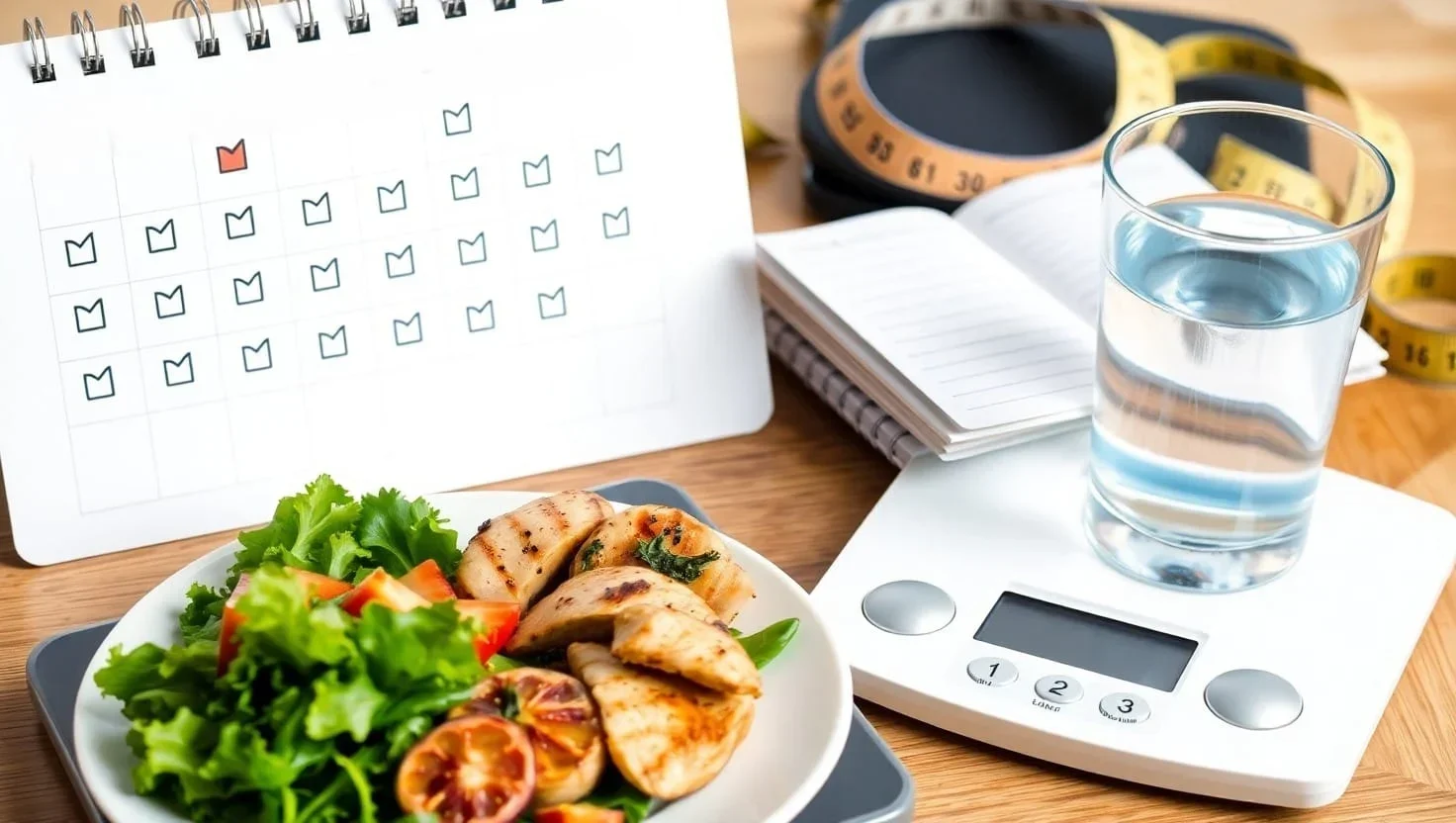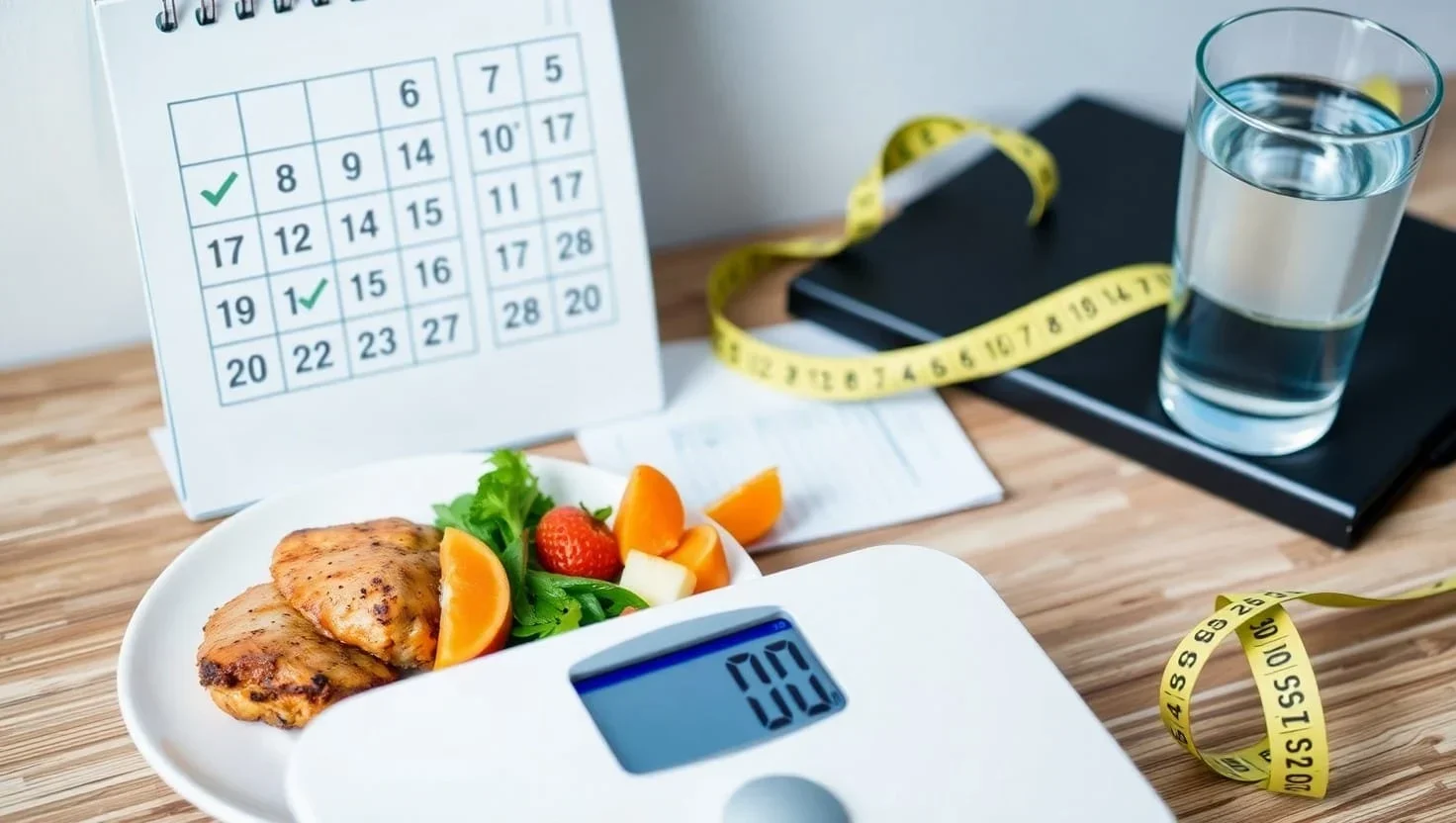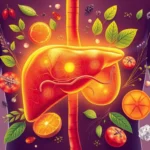Categories:
Ever thought about cutting calories to lose weight fast? Let’s dive into the question: how long to lose 20 pounds on 1000 calories a day? Many of us look for quick ways to lose weight. But first, we need to understand calorie deficits and their role in weight loss.
Weight loss happens when we eat fewer calories than we burn. Our daily calorie burn is called total daily energy expenditure (TDEE). Eating 1000 calories a day aims to create a big calorie deficit for quick weight loss. But is this safe and lasting? Let’s look at the science behind losing 20 pounds and the time it might take on a 1000-calorie diet.

The temptation of losing weight quickly is strong. But we must think about the health risks of very low-calorie diets. As we explore this topic, we’ll look at what affects weight loss, the dangers of extreme calorie cutting, and better ways to reach your weight loss goals.
💪 Get Fit, Feel Great! Try These Top-Rated Weight Loss Supplements!
Table of Contents
Key Takeaways
- A calorie deficit is necessary for weight loss
- Eating 1000 calories a day creates a significant deficit
- Losing 20 pounds requires a total deficit of 70,000 calories
- Rapid weight loss can have health implications
- Individual factors affect weight loss timelines
- Sustainable approaches are key for long-term success
Understanding Weight Loss Fundamentals and Calorie Deficits
Weight loss is all about creating a calorie deficit. This means you burn more calories than you eat. Let’s dive into the science behind it and how it impacts your body.
What Creates a Calorie Deficit
A calorie deficit occurs when you burn calories through daily activities and exercise. At the same time, you eat fewer calories. For most adults, cutting 500 calories a day can lead to losing about a pound a week.
Women usually need 1,600-2,400 calories daily, while men need 2,200-3,000 calories.
The Science Behind 3,500 Calories Per Pound
To lose weight, you need to burn about 3,500 more calories than you eat to shed one pound. This is a helpful guideline, though it’s not exact. A combination of diet and exercise is best, but diet is more important for weight loss.
Daily Energy Expenditure Basics
Your body burns calories all day, even when you’re resting. This is called your Basal Metabolic Rate (BMR). For a 25-year-old woman weighing 150 pounds and standing 5’4″, the BMR is about 1,413 calories.
Activity level, age, and body composition all affect how many calories you burn daily.
| Activity | Calories Burned (30 min) | Weight Loss Potencial |
|---|---|---|
| Moderate Running | 270 | 0.23 lbs/week |
| Strength Training | Varies | Boosts metabolism |
Understanding these basics helps set realistic weight loss goals. Remember, losing 1-2 pounds per week is healthy and sustainable.
🚀 Boost Your Metabolism & Burn Fat – The Best Supplements Are Here!
How Long Will It Take to Lose 20 Pounds Eating 1000 Calories a Day
Many people aim to lose 20 pounds to get healthier. Eating 1000 calories a day might seem like a quick way to do this. But, it’s key to know the time frame and effects of such a diet.
Experts say losing 1 to 2 pounds a week is safe. So, losing 20 pounds could take 10 to 20 weeks. A 1000-calorie diet can lead to quick weight loss at first. Yet, it’s not a good long-term plan.

| Average Daily Calorie Needs | Females | Males |
|---|---|---|
| Calorie Range | 1,800–2,400 | 2,400–3,200 |
| Recommended Deficit | 500 | 500 |
| Deficit on 1000-cal Diet | 800–1,400 | 1,400–2,200 |
Eating 1000 calories a day might help you lose weight quickly. But, it’s not a healthy choice. The National Institute of Diabetes and Digestive and Kidney Diseases recommends using their Body Weight Planner. This tool helps set safe and realistic weight loss goals.
The time it takes to lose 20 pounds differs for everyone. Your starting weight, how active you are, and your metabolism matter. A better way to lose weight is by eating a bit less and moving more. This approach helps you lose weight and keep it off for good.
🎯 Target Fat & Get Results – Find the Perfect Supplement Today!
Health Implications of a 1000-Calorie Diet
A diet of 1000 calories a day can lead to quick weight loss. But, it’s important to know the health risks. Let’s look at how such a diet affects your body and mind.
Nutrient Deficiencies
Following a 1000-calorie diet makes it hard to get all the nutrients you need. Most adults need 1,600-2,000 calories a day to stay healthy. Eating so few calories can cause a lack of vitamins and minerals, harming your health.
Metabolic Changes
Your body might think you’re starving on a very low calorie diet. It will slow down your metabolism to save energy. This can cause you to lose muscle, making it harder to lose weight later.
Physical and Mental Effects
Eating only 1000 calories a day can make you feel tired, weak, and have low energy. You might always feel hungry, leading to overeating. Mentally, strict dieting can cause stress and make you obsessed with food. It’s key to eat a balanced diet for your body and mind.
| Effects of 1000-Calorie Diet | Potential Consequences |
|---|---|
| Rapid Weight Loss | 2-3 pounds per week |
| Nutrient Deficiencies | Weakened immune system, hair loss |
| Metabolic Slowdown | Difficulty maintaining weight loss |
| Muscle Loss | Decreased strength, slower metabolism |
| Mental Effects | Mood swings, food obsession |
While a 1000-calorie diet might seem like a quick solution, it’s not healthy in the long run. Aim for a balanced diet with a moderate calorie cut for safe, lasting weight loss.
💥 Fast, Safe & Effective – Get the Top Weight Loss Supplements Here!
Setting Realistic Weight Loss Goals and Timelines

When you aim to lose weight, setting realistic goals is key. Sustainable weight loss comes from a balanced diet and regular exercise. The Centers for Disease Control and Prevention (CDC) says losing 1 to 2 pounds per week is safe and effective.
To lose 1 pound, you need to cut about 3,500 calories. For 20 pounds, that’s a total of 70,000 calories. It might seem tough, but we can break it down into smaller steps.
Reducing your daily calorie intake by 500 calories can lead to losing about 1 pound per week. This method is more sustainable than making big cuts. The goal is to reach a healthy weight, not just lose weight fast.
“Aim to lose 5% to 10% of your body weight during the first 6 months of your weight loss journey.”
Combining a balanced diet with regular exercise can help you lose more. For example, a 25-year-old sedentary female weighing 210 pounds could burn more calories. She could go from burning 2,095 to 2,700 calories a day by adding moderate exercise.
Setting realistic timelines is important. Losing 20 pounds might take 2-4 months, depending on your starting point and how consistent you are. Remember, slow and steady wins the race in sustainable weight loss.
⏳ Don’t Wait! Start Your Weight Loss Journey with These Supplements!
Factors Affecting Your Weight Loss Journey
Losing weight quickly depends on several factors. Your current weight, body composition, and activity level all play a big role. Let’s explore these elements to help you find the best way to lose weight and keep it off.
Starting Weight and Body Composition
Your initial weight impacts how fast you lose pounds. People with higher starting weights often see quicker results. This is because larger bodies burn more calories, even at rest.
Body composition matters too. Muscle tissue burns more calories than fat, so those with more muscle may lose weight faster.
Activity Level and Exercise
How active you are greatly affects weight loss speed. Regular exercise boosts your metabolism, helping you burn more calories throughout the day. Aim for at least 150 minutes of moderate exercise weekly to support your weight loss goals.

| Activity Level | Daily Calories (Women) | Daily Calories (Men) |
|---|---|---|
| Sedentary | 1,800 | 2,400 |
| Active | 2,400 | 3,000 |
Metabolic Rate Considerations
Your metabolic rate affects how quickly you lose weight. Factors like age, gender, and genetics influence metabolism. While you can’t change these, you can boost your metabolism through exercise and muscle building.
Remember, sustainable weight loss takes time. Aim to lose 1-2 pounds per week for lasting results. By understanding these factors, you can create a realistic plan to reach and maintain your ideal weight.
🏋️♀️ Power Up Your Weight Loss – Grab the Best Supplements Now!
Safe and Sustainable Weight Loss Approaches
I want to lose weight, but crash diets aren’t the way. A good diet plan aims for 1 to 2 pounds a week. This method helps you lose weight safely without losing health or dealing with water weight.
Over 650 million adults worldwide face obesity. The secret to losing weight is making lasting lifestyle changes, not extreme diets. A balanced diet and regular exercise are key.
When planning your diet, aim for a 500-750 calorie daily deficit. This slow pace helps you reach your goals without missing out on nutrients. Very low-calorie diets (under 800 calories) need a doctor’s watch and aren’t good for long-term use.

- Focus on nutrient-dense foods like fruits, vegetables, and whole grains
- Include lean proteins to help preserve muscle mass during weight loss
- Stay hydrated by drinking plenty of water throughout the day
- Incorporate at least 30 minutes of physical activity daily
Adopting these healthy habits will help you achieve lasting results. The goal is to keep a healthy weight for life, not just to lose weight fast. Be patient and stay consistent on your path to a healthier you.
🌟 Transform Your Body with These Top-Rated Weight Loss Supplements!
Creating a Balanced 1000-Calorie Meal Plan
A 1000-calorie diet is tough for weight management. It’s fast for weight loss, but focus on nutrient-rich foods to avoid missing out on nutrients. I’ll give you tips for a balanced meal plan that meets your goals.
Nutrient-Dense Food Choices
Every bite matters on a 500 calorie deficit diet. Opt for foods high in vitamins, minerals, and fiber. Lean proteins, colorful veggies, and whole grains are great choices. Here’s a sample day on a 1000-calorie plan:
| Meal | Food | Calories |
|---|---|---|
| Breakfast | Greek yogurt with berries | 200 |
| Lunch | Grilled chicken salad | 300 |
| Dinner | Baked salmon with asparagus | 400 |
| Snack | Apple slices | 100 |
Meal Timing and Frequency
Eating small, frequent meals helps manage hunger on a low-calorie diet. Spread your calories over 3-4 meals and 1-2 snacks. This keeps your energy steady all day.
Hydration Requirements
Drinking enough water is vital for losing 2 lbs a week. Aim for 8 glasses a day. Herbal teas and water-rich foods like cucumbers also help.

Remember, a 1000-calorie diet is very strict. Use a calorie calculator to see if it’s right for you. Always talk to a healthcare professional before starting any extreme diet.
🚫 No More Crash Diets! Get Real Results with the Best Supplements!
Exercise Recommendations While on Low-Calorie Diet
Exercise is key when trying to lose weight. I aim to burn more calories and reach a healthy weight. Adding moderate exercise to a low-calorie diet boosts calorie burn, helping me lose weight faster.
Trying to lose 20 pounds is a good goal. But, it’s important to be careful on a 1000-calorie diet. The CDC suggests losing 1 to 2 pounds weekly for safe weight loss. I’ll mix cardio and strength training to reach this goal.

Cardio exercises like brisk walking, swimming, or cycling burn many calories. Starting with 30 minutes of moderate-intensity cardio 3-5 times a week is a good goal. As I get better, I can increase the time and intensity.
Strength training is also vital. It helps keep muscle mass while losing fat. I aim for 2-3 strength training sessions per week, focusing on major muscle groups. This can include bodyweight exercises, resistance bands, or light weights.
It’s important to listen to my body and not overdo it. If I feel dizzy or extremely tired, I’ll reduce the intensity or take a rest day. Staying hydrated and eating nutrient-dense foods is key for supporting my exercise routine on a low-calorie diet.
Combining exercise with a balanced diet is essential for reaching and maintaining weight loss goals. Research shows this approach is most effective for managing weight in the long term.
🥇 #1 Weight Loss Supplements Revealed – Get Yours Today!
Common Challenges and How to Overcome Them
Losing weight can be tough, and eating fewer calories than you burn makes it harder. Many people face common issues that slow down their progress. Let’s tackle these challenges head-on.
Dealing with Hunger
When you cut calories, hunger often kicks in. To manage this, eat several small meals throughout the day. This helps control hunger and can lead to better weight loss results.
Snacking on nuts is a smart choice. Studies show nut eaters tend to be slimmer.
Managing Energy Levels
Low energy is common when your calorie intake drops. To keep your energy up, don’t skip breakfast. People who eat breakfast daily are more likely to maintain weight loss.
Also, stay hydrated. Proper water intake can speed up your metabolism and help you lose weight faster.
Preventing Weight Loss Plateaus
Plateaus happen when the rate of loss slows down. To avoid this, keep track of your progress. Successful weight loss maintainers weigh themselves at least once a week.
Regular exercise, like walking, can help you maintain weight loss and break through plateaus.

Remember, extreme calorie cuts can lead to side effects like dizziness, fatigue, and nutrient deficiencies. It’s important to set realistic goals. Losing just 5% of your body weight can bring significant health benefits.
Focus on gradual, sustainable changes to your diet and lifestyle for long-term success.
🎉 Join Thousands Who’ve Lost Weight – Find the Right Supplement Here!
Monitoring Progress and Adjusting Your Plan
Tracking your weight loss journey is key to success. Use a calorie calculator online to see how many calories you burn daily. This helps set realistic goals for losing 1 to 2 pounds a week.
Regular weigh-ins are important, but don’t obsess over daily changes. Look at weekly trends instead. Losing weight too fast is not safe. It often leads to gaining back the weight and more.
Adjust your plan if you’re not seeing results. If you’re not losing weight after a few weeks, check your calorie intake and activity level. A safe calorie deficit for losing weight is 500-1000 calories a day.
| Activity Level | Women (calories) | Men (calories) |
|---|---|---|
| Sedentary | 1,800 – 2,400 | 2,200 – 3,000 |
| Moderately Active | 2,000 – 2,600 | 2,400 – 2,800 |
| Very Active | 2,200 – 2,800 | 2,800 – 3,200 |
Listen to how you feel. Your energy levels, mood, and sleep quality show your health. If you’re always tired or irritable, you might be eating too little.
Be patient with your progress. Losing weight takes different times for everyone. Celebrate small wins like better fitness or clothes that fit better. These small victories keep you motivated on your weight loss journey.
Conclusion
I’ve looked into losing 20 pounds on a 1000-calorie diet. To lose one pound, you need to burn 3,500 calories. A 1000-calorie diet might lead to quick weight loss, but it’s not healthy for the long run. The calories you burn are key to your weight loss journey.
Weight loss isn’t healthy if it’s too fast or extreme. Instead of big cuts, make small, lasting changes. Try taking the stairs or adding a short walk to your day. These small actions help you lose weight without harming your health.
The best way to lose weight is slowly and healthily. Aim to lose 1-2 pounds a week. This method helps you reach your goal and keeps the weight off for good.
🌍 Your Dream Body Starts Here – Get the Best Supplements Now!
FAQ
For “How Long Will It Take to Lose 20 Pounds Eating 1000 Calories a Day?”
Q: How long does it take to lose 20 pounds on a 1000 calorie diet?
A: The time it takes to lose 20 pounds eating 1000 calories per day can vary depending on factors such as your starting weight, metabolism, and activity level. Generally, a safe weight loss rate is 1-2 lbs per week, so it could take 10-20 weeks to lose 20 pounds. However, eating only 1000 calories per day is a very low-calorie diet and may lead to rapid weight loss, which can be unsafe and unsustainable.
Q: Is it possible to lose 20 lbs in 1 month eating 1000 calories a day?
A: While it’s technically possible to lose 20 pounds in 1 month on a 1000-calorie diet, it’s not recommended. Rapid weight loss at this rate can be dangerous and may lead to muscle loss, nutrient deficiencies, and other health issues. A more realistic and safe weight loss goal would be 4-8 pounds per month.
- Lose Weight While You Sleep: Dr. Vitamin’s nighttime fat burners for women and men feature an innovative formula that wo…
- Restorative Sleep for Energized Mornings: This night-time fat burner for women is stimulant-free and promotes deep and r…
- Amino Acid Enhanced Support: Powered by L-Arginine and L-Glutamine, these appetite suppressant weight loss pills for wom…
Q: What are some weight loss tips to help me reach my target weight?
A: To lose weight and maintain it in a healthy way, consider these tips: focus on a balanced diet with plenty of fruits, vegetables, and lean proteins; incorporate regular exercise into your routine; stay hydrated; get enough sleep; and manage stress. Remember, sustainable weight loss is about lifestyle changes, not extreme diets.
Q: Is eating 1000 calories per day a safe way to lose weight?
A: Eating 1000 calories per day is generally not considered a safe or sustainable way to lose weight for most adults. This is a very low-calorie diet that may not provide enough nutrients and energy for your body to function properly. It’s important to consult with a healthcare professional before starting any restrictive diet.
Q: How can I keep the weight off after losing 20 pounds?
A: To maintain your lower weight after losing 20 pounds, focus on adopting long-term healthy habits. This includes continuing to eat a balanced diet, staying active with regular exercise, monitoring your portion sizes, and making lifestyle changes that you can stick to. Avoid returning to old habits that may lead to weight regain.
Q: What happens if I lose weight too quickly?
A: Losing weight too quickly can have negative consequences on your health. Rapid weight loss may lead to loss of muscle mass, nutrient deficiencies, gallstones, and a slower metabolism. It can also increase the likelihood of weight regain once you return to normal eating habits. Aim for a gradual, steady weight loss of 1-2 pounds per week for better long-term results.
- Maximum Fat Burning Potential – Enhance your body’s ability to burn stubborn fat with Dr. Vitamin’s Thermogenic Belly Fa…
- Energy Boosting Formula: Say goodbye to sluggish days! With caffeine and green tea extract, our metabolism booster for w…
- Curb Cravings and Appetite: Struggling with cravings? Our blend of Apple Cider Vinegar, Garcinia Cambogia, and other nat…
Q: How many calories should I eat to lose weight in a healthy way?
A: The number of calories you should eat to lose weight healthily depends on various factors such as your age, gender, height, current weight, and activity level. Generally, a moderate calorie reduction of 500-750 calories per day from your maintenance calories can lead to safe and sustainable weight loss. For most people, this means consuming at least 1200-1500 calories per day for women and 1500-1800 for men.
Related Articles:
- 10 Healthy Cookbooks to Kickstart Your Weight Loss Journey in 2025
- How Long Does it Realistically Take to Lose 20 Pounds? A Detailed Guide
- What is the 30-30-30 Rule for Weight Loss: How To Follow the 30-30-30 Diet to Lose Weight
- How Much Weight Can You Lose in a Month? Tips to Lose 10 Pounds
- What is the Best Snack for Weight Loss? Healthy Snacks Under 100 Calories
Our Partners: CSKDesignCrafts.com – DesignersReport.com – LifeCraftCentre.com
This post may contain affiliate links which means I may receive a commission for purchases made through links. There is no additional charge to you! Thank you for supporting my blog so I can continue creating free content each week!










